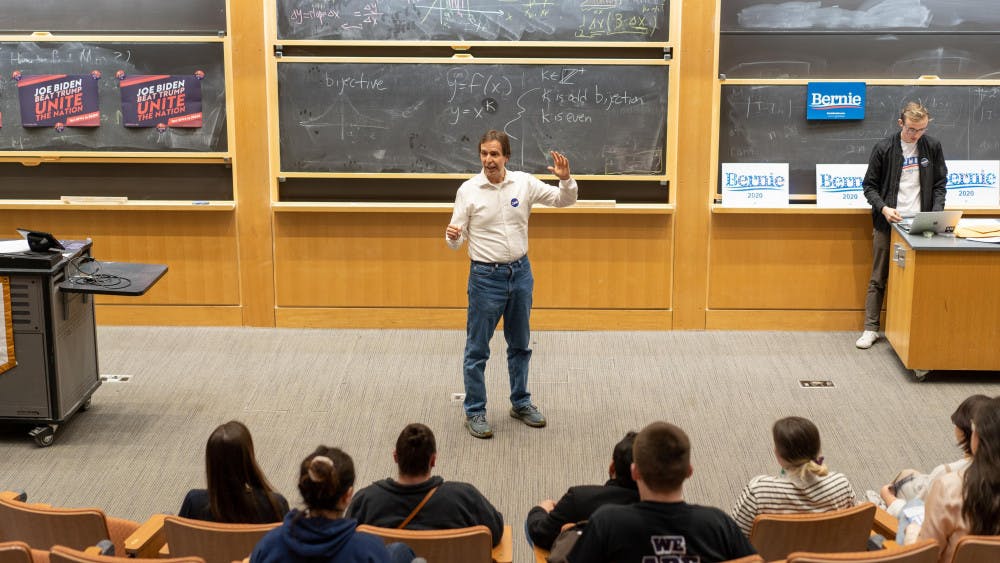Ten Iowans sat in an auditorium waiting to caucus Monday night. But unlike tens of thousands of registered voters in the Hawkeye State, they were over 1,000 miles away from their home.
MacMillan Hall hosted its first satellite Iowa Caucus, welcoming voters, observers and campaign supporters.
After about half an hour of caucusing, the caucus site’s four delegates were split two and two between Sen. Bernie Sanders (I-VM) and Sen. Elizabeth Warren (D-MA).
The caucus held at the University functioned as one of the 87 “satellite caucuses,” which take place at different places and times than the traditional precincts, including some out-of-state and out-of-country locations. This year’s use of satellite sites was a move by the Iowa Democrats to allow more people to vote.
All the satellite caucuses were treated as one county. The “county” contributes to deciding what portion of Iowa’s 41 delegates go to each candidate. Iowa does not have a winner-takes-all system, so it can send delegates for different candidates to the National Democratic Convention in July.
To begin the caucusing process, the precinct captains representing the campaigns of former Vice President Joe Biden, entrepreneur Andrew Yang ’96, Sanders and Sen. Amy Klobuchar (D-MN) gave minute-long speeches to the attendees, attempting to sway the room.
Supporters for different candidates gathered together in groups around the auditorium.
Non-voting attendees set up camp in different parts of the auditorium, with some hanging posters. Sanders’ camp had light-up signs, while Yang’s representatives brought a life-sized cardboard cutout of their candidate.
After the first vote, Sanders and Warren received six and three voters, respectively. Klobuchar received one vote, failing to meet the 15 percent threshold of viablity.
Despite a campaign presence for Yang and Biden, neither candidate received support from any caucus voters.
With a switch by Claire Brown ’22 — who was so excited to caucus that she sent photos of her participation back home to her family in Iowa — from Klobuchar’s to Warren’s camp, the Massachusetts senator finished with four. The caucus site’s four delegates were then split evenly between Sanders and Warren, as neither received enough votes to meet a 3/4 majority.
This was the first caucus experience for many participants, and it was one they were looking forward to.
Connor Johnson ’21 organized the satellite caucus. Johnson, who voted in person in the Iowa caucuses in 2016, began the application process to hold a caucus in Rhode Island over the summer. He says the process is lengthy: Organizers have to ensure that only registered Iowa voters will be participating, and they must properly advertise the caucus and report its results.
Despite the challenging organization process, Johnson likes the new satellite system. “Normally, the caucuses are pretty disenfranchising,” he said. The satellite system “is allowing a lot of people who would not have access to the caucus to get involved in the process.” Johnson says people who work night shifts, have children or live out of state often cannot participate.
Many caucusgoers shared Johnson’s concerns over the system’s lack of accessibility. They welcomed the satellite caucus as a step in the right direction.
Sarah Murphy, who came all the way from Hartford, Connecticut to caucus, agreed. “I absolutely was excited,” she said. “This is a great ability for those of us who can’t get to Iowa.”
Murphy caucused for Sanders primarily because of his promise to cancel student loan debt, she said, but she also likes the social changes he is proposing. In addition to being the most favored candidate among caucus voters in attendance, Sanders was supported by 10 observing University students, who brought signs and clapped vigorously after a speech in favor of the senator.
Maggie Levandoski ’22 voted for Warren in the caucuses. “I’ve looked at her plans and her proposals, and I think that I agree with a lot of what she is putting forward,” she said. Levandoski, who also respects that Warren has changed her party alignment from Republican to Democrat, said “(Warren) went and she listened to people, and she listened to the problems they were having and what they had to say, and she changed her direction.”
At press time, the full results of the Iowa caucus had not been reported.

Ben Glickman is the 132nd editor-in-chief and president of The Brown Daily Herald. He previously served as a metro editor and oversaw the College Hill and Fox Point beat, in addition to writing and editing about city politics, COVID-19 and the 2020 election. He is the co-creator of the Bruno Brief, The Herald's first news podcast. In his free time, he is passionate about birds (also tweeting) and eating way too spicy food.





